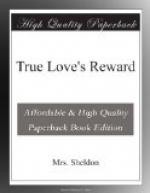“Well, I must confess that the affair is very much mixed—very much mixed,” said the lawyer, with peculiar emphasis, “but I believe, now that I know the whole story, that the truth can be ascertained if right measures are used; and,” he continued, impressively, “if we can prove that you are what you assert, the only child of Richmond Montague and Mona Forester, you will not only inherit the money left by Homer Forester, but, being the child of the first union—provided we can prove it legal—you could also claim the bulk of the property which your father left. Mrs. Montague, if she should suspect our design, would, of course, use all her arts to conceal the truth; but I imagine, by using a little strategy, we may get at it. Yes, Miss Montague, if we can only work it up it will be a beautiful case—a beautiful case,” he concluded, with singular enthusiasm.
Mona gave utterance to a sigh of relief. She was more hopeful than ever that the mystery, which had so troubled her, would be solved, and she was very grateful to the kind-hearted lawyer for the deep interest he manifested in the matter.
“You are very good,” she said, as she arose to take her leave; “but really, as I have said before, I am not so anxious to secure property as I am to know more about my parents. Do you suppose,” she questioned, with some anxiety, “that the enmity between my uncle and my father was so bitter that—that Uncle Walter was in any way responsible for his—my father’s—death?”
“Poor child! have you had that terrible fear to contend against with all your other troubles?” asked Mr. Corbin, in a tone of compassion. “No, Miss Montague,” he added, with grave positiveness, “I do not believe that Walter Dinsmore—and I knew him well—ever willfully committed a wrong against any human being. Now,” he resumed, smiling, to see the look of trouble fade out of her eyes at his assurance, “I am going to try to ferret out the ‘mystery’ for you. Come to me again in a week, and I believe I shall have something definite to tell you.”
Mona thanked him, after which he shook hands cordially with her, and she returned to West Forty-ninth street.
“Well, well!” muttered the lawyer, after his fair client had departed, “so that is Dinsmore’s niece, who was to have had his fortune, if he could have had his way about it! I wonder what Madame Dinsmore would say if she knew that I had taken her husband’s protegee as a client! It is a burning shame that she could not have had his money, if it was his wish—or at least a share of it. Poor little girl! after living in such luxury all her life, to have to come down to such a humdrum existence as sewing for a living! I will do my best for her—I will at least try to secure Homer Forester’s money to her. It’s strange, too, that I should happen to have dealings with the brilliant Mrs. Montague, also. It’s a very queer case and there is a deep scheme behind it all! I believe—”




